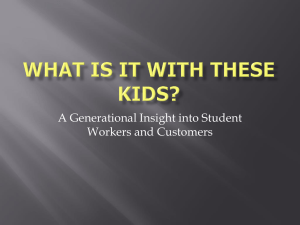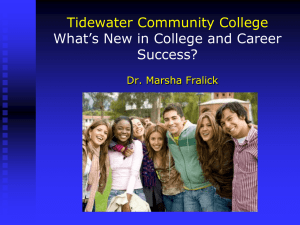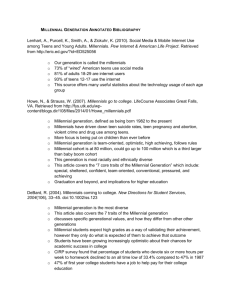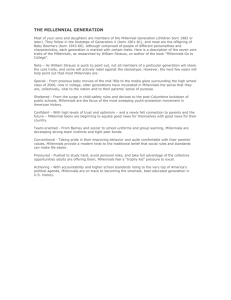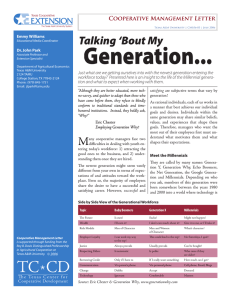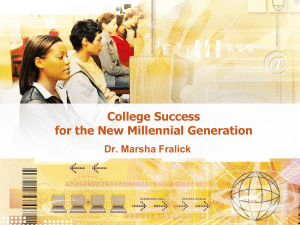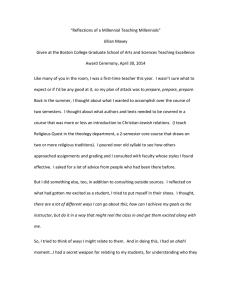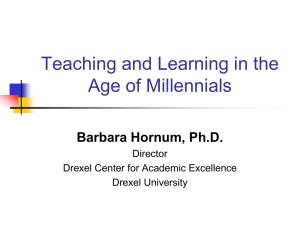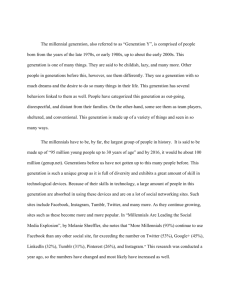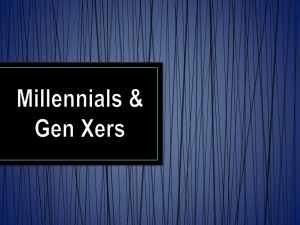Mary Bart – The Five R`s of Engaging Millenial Students
advertisement
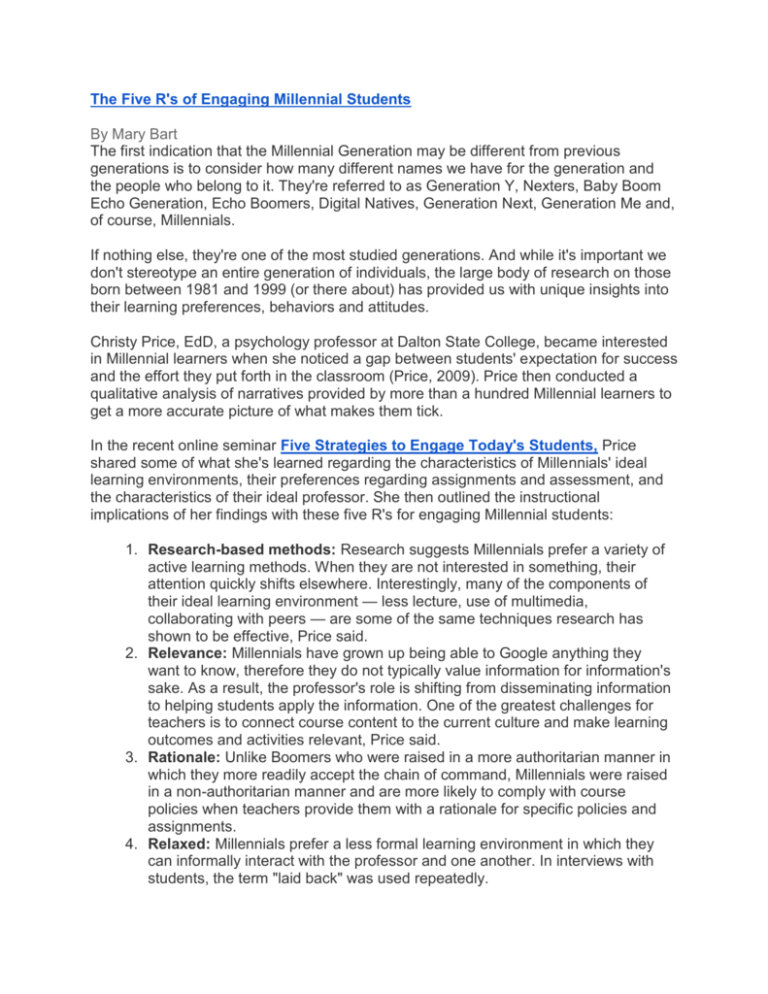
The Five R's of Engaging Millennial Students By Mary Bart The first indication that the Millennial Generation may be different from previous generations is to consider how many different names we have for the generation and the people who belong to it. They're referred to as Generation Y, Nexters, Baby Boom Echo Generation, Echo Boomers, Digital Natives, Generation Next, Generation Me and, of course, Millennials. If nothing else, they're one of the most studied generations. And while it's important we don't stereotype an entire generation of individuals, the large body of research on those born between 1981 and 1999 (or there about) has provided us with unique insights into their learning preferences, behaviors and attitudes. Christy Price, EdD, a psychology professor at Dalton State College, became interested in Millennial learners when she noticed a gap between students' expectation for success and the effort they put forth in the classroom (Price, 2009). Price then conducted a qualitative analysis of narratives provided by more than a hundred Millennial learners to get a more accurate picture of what makes them tick. In the recent online seminar Five Strategies to Engage Today's Students, Price shared some of what she's learned regarding the characteristics of Millennials' ideal learning environments, their preferences regarding assignments and assessment, and the characteristics of their ideal professor. She then outlined the instructional implications of her findings with these five R's for engaging Millennial students: 1. Research-based methods: Research suggests Millennials prefer a variety of active learning methods. When they are not interested in something, their attention quickly shifts elsewhere. Interestingly, many of the components of their ideal learning environment — less lecture, use of multimedia, collaborating with peers — are some of the same techniques research has shown to be effective, Price said. 2. Relevance: Millennials have grown up being able to Google anything they want to know, therefore they do not typically value information for information's sake. As a result, the professor's role is shifting from disseminating information to helping students apply the information. One of the greatest challenges for teachers is to connect course content to the current culture and make learning outcomes and activities relevant, Price said. 3. Rationale: Unlike Boomers who were raised in a more authoritarian manner in which they more readily accept the chain of command, Millennials were raised in a non-authoritarian manner and are more likely to comply with course policies when teachers provide them with a rationale for specific policies and assignments. 4. Relaxed: Millennials prefer a less formal learning environment in which they can informally interact with the professor and one another. In interviews with students, the term "laid back" was used repeatedly. 5. Rapport: Millennials are extremely relational. They are more central to their parents' lives than previous generations and are used to having the adults in their lives show great interest in them. They appreciate it when professors show that same interest, and they seem to be more willing to pursue learning outcomes when instructors connect with them on a personal level. For many faculty, particularly those who teach large classes, rapport is the most difficult of the five R's, Price said. "The idea here is student learning outcomes, and getting students to achieve learning outcomes is a persuasive endeavor as much as we might hate that," she said. "Students are going to be more likely to work toward achieving their learning outcomes if they have a positive rapport with us. ... You don't have to be their best friend. You just have to be perceived as being on their side." References: Price, C. (2009). Why Don't My Students Think I'm Groovy? The Teaching Professor, 23 (1), 7. Price, C. Five Strategies to Engage Today's Students. Magna Online Seminar. 1 Nov. 2011. Five Strategies to Engage Today's Students A great deal of attention has been focused on Millennials, but what factors truly influence their motivation and desire to learn? Obviously, there are some influences beyond your control, but research suggests that one thing we can do to increase student engagement is to create a more relaxed learning environment, and provide students with clear expectations and regular feedback. Presented earlier this month, Five Strategies to Engage Today's Students provides specific strategies for reaching and teaching Millennials. The 90-minute seminar includes supplemental materials such as rubrics, questions for discussion and selfassessment, and worksheets that you can adapt for your courses and your teaching style. Learn the keys to connecting with Millennial learners » Scholarly Work on Teaching and Learning Award Have you authored a scholarly article? Or perhaps read one that is bookmarked, dogeared, and referred to on a regular basis? If so, we want to hear about it! The Teaching Professor and Magna Publications are seeking nominations for the Maryellen Weimer Scholarly Work on Teaching and Learning Award. Now in its fourth year, the award recognizes outstanding scholarly contributions that advance college-level teaching and learning practices, and includes a $1,000 stipend for the winning author(s). If you value scholarship, please take a few minutes and nominate your favorite article for this important award. A complete list of criteria and submission procedures can be found here » Faculty Focus 2718 Dryden Drive • Madison, WI 53704-3086 • 1-800-433-0499 • support@facultyfocus.com Link to website: http://ebm.facultyfocusemail.com/c/tag/hBOw7$KB8X3cvB8eUE1AAAZJb9U/doc.html?t_para ms=EMAIL%3Djoanhub%2540yahoo.com%26PASSWORD%3DB8X3cvAAAZJbBOw7%252 4Ko4cP6PfbdneB&utm_source=cheetah&utm_medium=email&utm_campaign=2011.11.15%20Faculty%20Focus%20Update


